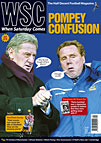 Cambridge United’s slide out of the League threatened to bring a renewal of derby hostilities against Cambridge City. But, writes Andrew Bennett, suddenly prospects are bleak for the Conference South side, now fighting for survival as a separate club
Cambridge United’s slide out of the League threatened to bring a renewal of derby hostilities against Cambridge City. But, writes Andrew Bennett, suddenly prospects are bleak for the Conference South side, now fighting for survival as a separate club
There’s no such team as “Cambridge Football Club”. And if the supporters of the seat of learning’s two senior sides, City and United, have their way, there never will be, despite current talk of a possible merger. But, as one club fights for its existence, the question arises: when is a “merger” not a merger?
United’s travails have been well documented; though now in the Conference, at least they’re out of administration. Financially, they are at last – slowly – on the mend. But less well publicised has been the crisis engulfing their neighbours across the river.
City were historically top dogs in Cambridge, but the more ambitious United gained Southern League parity by 1960 and the end of City’s reign was signalled in 1968 by relegation and a bitter mass brawl involving players and fans in the County Cup final; come 1970, United’s election to Division Four seemed to herald a permanent end to a once-passionate rivalry.
Fast forward to 2005 and a dramatic turnaround on the pitch sees United demoted and a resurgent City a play-off final win away from joining them in the Conference with their best side since their Sixties heyday. But such success had been achieved at a cost.
Rumours had been flying for years that City were living beyond their means. Then it leaked out that the chief executive who left under a cloud in 2003 had left behind a cabinet full of unopened bills. Their debts were in the hundreds of thousands. The wage bill was out of all proportion to the club’s ability to pay.
The new board eschewed professional advice to shut the club down and pressed on in Micawberesque hope. The City Ground was sold to developers in 2004 to pay creditors, without fans’ or shareholders’ knowledge. But they realised only a fraction of the site’s worth, due to a series of crippling covenants and leases that had to be satisfied. The board gambled its remaining money on team strengthening without solving the fundamental stadium issue.
By all accounts City are down to their last £400,000 and must relocate within a couple of years. Now that the truth has emerged, City’s small but devoted following is up in arms. The board claims that the only realistic option is to amalgamate their academy with the remnants of United’s and run the team under the City name from United’s Abbey Stadium in the Eastern Counties League, surviving on grants, with the first team “in cold storage” until it can be revived at a venue unknown with the remaining ring-fenced cash.
Unsurprisingly, such a “solution” is anathema to the City faithful, seeing it as a merger in all but name and an end to their 98-year-old identity. Nor would fan-led United wish to be party to City’s extinction after their own recent experiences. An action group has been formed and a fans’ trust is in the offing. But, with insufficient funds for a new ground and an unsympathetic council, their options are pitifully limited.
A full groundshare with United or Conference South rivals Histon appears to be unaffordable. Some fans would rather start again in the county league than be subsumed in another club. Bitter pro- and anti-board factions are now at each other’s throats as rumours and propaganda fly. Has every option been explored? It depends on whom you ask. And the latest bombshell is that, without the statutory minimum ten-year ground lease, City would be ineligible to play in the Conference next season.
United’s property developing director, John Howard, is keen on constructing a “community stadium” on the edge of town with the proceeds of a sale of the Abbey, and some sort of partnership with City might be attractive. But Howard is viewed with suspicion even by his own club’s supporters, notwithstanding his recent “in principle” agreement to sell the Abbey back to the club after becoming their landlord at a prohibitive rent in 2004. And the spectre of a please-nobody MK Dons-lite “AFC Cambridge” emerging in a soulless out-of-town tin box is one that haunts both sets of supporters.
In all likelihood, United’s long-term future is in a new ground that can generate the regular income they need to survive. City’s future is far less clear and, with support only in the hundreds, some painful downsizing looks all but inevitable. But their followers’ fierce pride and will to survive remains. And “merger” will forever remain a dirty word on both sides of the Cam.
From WSC 230 April 2006. What was happening this month